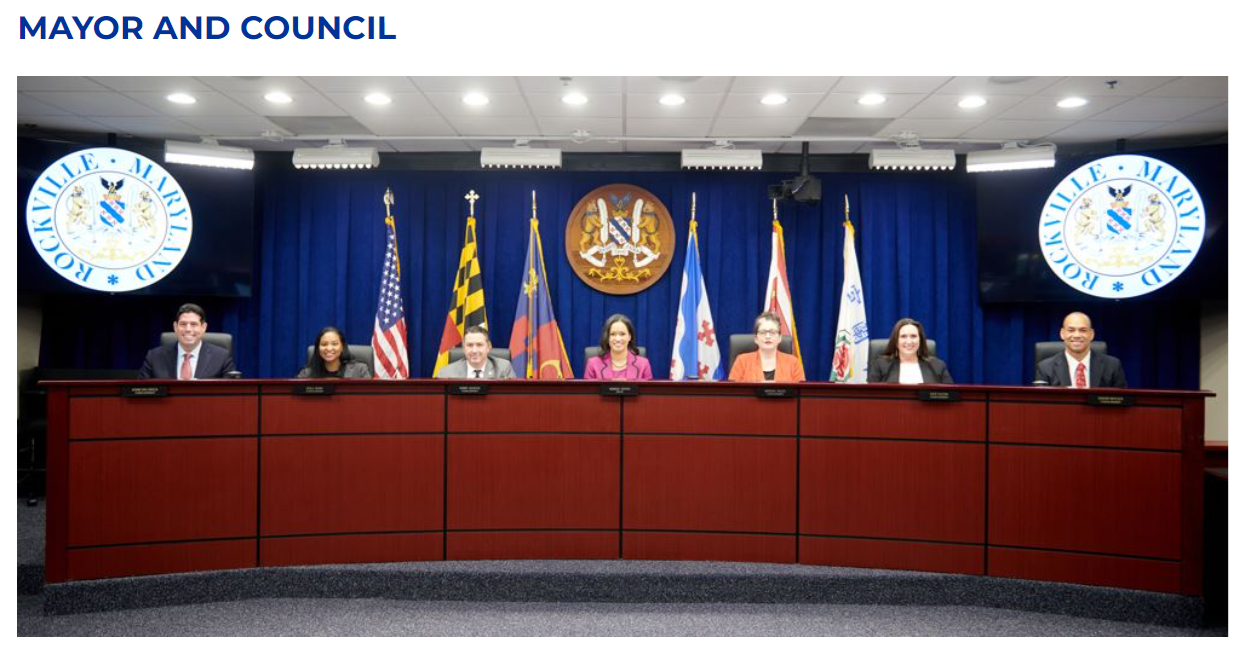By Adam Pagnucco.
When Montgomery County passed rent control last year, its legislation did not cover municipalities. The Gaithersburg City Council wrote a letter of opposition to rent control before the county bill passed, so Gaithersburg looks unlikely to join in for the foreseeable future. Now the same can be said for the City of Rockville.
Back in April, I wrote that the Rockville City Council planned to hold a discussion about rent control in the future. That discussion occurred last night. City council meetings in Rockville are preceded by community forums in which residents may comment directly to the council. I heard that last night’s forum lasted roughly 3 hours – an unusually long period of time – and was dominated by rent control. Next came a discussion by the city council based on a long presentation by staff outlining rent control’s advantages and disadvantages. Video of the meeting is not yet available but I heard that this discussion lasted about an hour.
In the end, Council Member Adam Van Grack made the following motion:
I hereby make a Motion to direct City Staff to prepare for a discussion (for our next affordable housing work session) for new renter protections in Rockville, including actions to better address improper rental conditions; enforce code violations; and initiatives to address housing affordability and transparency including but not limited to disclosures on fees, past rent increases, and programs to incentivize adherence to voluntary rental guidelines, but without mandatory hard caps on rental renewal rates.
The motion was seconded by Council Member Kate Fulton and passed 5-2. Voting in opposition were Council Members David Myles and Izola Shaw.

Rockville’s Mayor and City Council. Photo courtesy of the City of Rockville.
Note that this was a discussion and not a vote on legislation. Myles and Shaw could still follow up with a rent control bill, but since 5 of the 7 council members are now on record as not wanting to further consider “mandatory hard caps on rental renewal rates,” it seems unlikely that such a bill could pass the current council.
I asked Van Grack for comment. He sent me the following statement:
Increasing affordable housing and assisting the renter community in Rockville is an extremely important goal. Thus, yesterday, the Mayor and Council of Rockville directed staff to consider for future discussion numerous policies and programs that, we believe, will assist people who are in rental housing in Rockville (and who will be in rental housing the future). We also directed staff to exclude mandatory caps on rental renewal rates from future discussions of policies and programs in Rockville. Our goal is to expand people’s opportunities to secure quality housing in Rockville, and I am extremely hopeful that we are moving in the right direction towards this goal. However, given the research and data currently available, I am concerned that mandatory caps on rental renewal rates will have the opposite effect, potentially having unintended consequences to the housing market and the local economy as well as diminishing the quality of life for our renter community.
Rent control has ruinous effects on housing markets and has shut down multifamily housing construction in Takoma Park. It was adopted by Montgomery County during the 1970s but repealed after it led to the conversion of thousands of rental units into condos. County developers began canceling housing projects even before the 2023 county rent control bill passed. Since the county bill won’t take effect until regulations are approved, it’s much too soon to evaluate its impact – which will occur over the course of years.
The (so far) rejection of rent control by Rockville and Gaithersburg creates an interesting scenario. Both cities are large, have attractive amenities, and have independent planning authority. Rockville contains two Metro stations and is adjacent to a third. Gaithersburg is getting closer to redeveloping its Lake Forest Mall site. Both cities have a lot to offer multifamily builders.
All of this opens the possibility of Rockville and Gaithersburg becoming islands of new housing supply within Montgomery County. That would be great for the tax bases of both cities but challenging to manage the resulting infrastructure needs. It would help make the case for new transit like bus rapid transit on MD-355 and the Corridor Cities Transitway (or something like it) to support new housing. It would also shift the center of population gravity – and perhaps even political gravity – away from Downcounty and towards the twin cities, something that city leaders would welcome. Any such changes would take many years and depend in part on how Montgomery County implements rent control in practice. But it’s conceivable that what we are now witnessing could be someday considered an important part of the county’s history.
